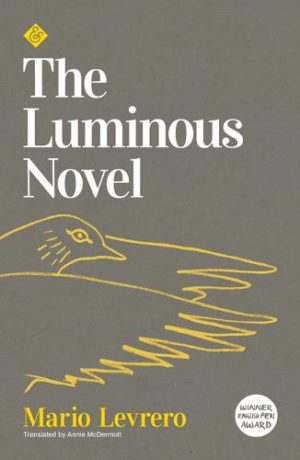You have no items in your cart. Want to get some nice things?
Go shopping
Do you believe in experiences that many a time confound you? The Luminous Novel, a posthumously published novel by the Uruguayan author Mario Levrero now out in English, is about just that. It was an undertaking that he knew he may not finish, and it was with this in mind that he sat down to write a work that had been unfinished for sixteen years. With a grant to support the writing of the novel and no plan except the hope that things would take shape as he proceeded, he set to work. The Luminous Novel is a record of that process.
From the outset, the author clarifies: “Any people or institutions who feel affected or injured by the opinions expressed in this book should understand that these opinions are nothing but the ravings of a senile mind.” The prologue itself dwells on the impulse to write the novel, a conversation with a friend about transcendent experiences, and the difficulty in writing them down. “This whole book is the testimony of a monumental failure,” the author tells us, a failure mostly to do with his inability to finish the novel as he had wanted. However, despite these misgivings, the book is complete in its own inimitable way. It is divided into three parts, a prologue titled “Diary of the Grant,” which takes up over four hundred of the book’s pages; then what there is of “The Luminous Novel”; and then the “Epilogue to the Diary,” which ties up some loose ends.
The author further talks about his particular arrangement of his writing tools, which remains the theme for the rest of the first part of the book. While not in any way a religious sermon, there is plenty of sermonising along with the author’s biographical anecdotes, through which he talks about philosophy. It starts with his fear of his surgery, a fear of pain and death. A reader can feel the author’s inertia in starting something new and not knowing where it is going while transforming ennui into habit and routine. Distractions mount. He starts by changing what is already there: the furniture, his surroundings. He commits to introspection. He reflects on dreams and his changing relations with people. And daily and mundane affairs are presented in an interesting way as well, including through Visual Basic and the author’s addiction to “things on the computer.”
We often see and value the outcome of a project, but what about the process behind it? This novel is the outcome and the process both in the form of a daily journal and a memoir for oneself. Realism and profound thought creep into its benign and intimate tone. Throughout, there are many interesting character sketches of the author’s friends, partners, and family with parallels to literary figures and other authors. The author gives a description or an impression of them all, impressions that are stark and often blisteringly honest – and in which he doesn’t spare himself.
In fact, he spares very little at all. The novel is filled with the daily happenings of life, the small things that we often find too trivial to note as we lead our busy lives, giving a peek into the author’s mind and his memories, the dimensions of his lingering past. And yet he also discusses much deeper emotions and states of being, such as depression, insomnia, and the inescapable fear of death. Through his commentary on life, often dry but never dithering, we get to look at whole passages of a life lived: people and their actions, their impact, consequences, memories that reads like a retrospective summary of all the decisions the author took in his life and what changed as a result. Experiences which beget insight. Experiences that could be mental, physical, or even metaphysical.
These seemingly minor events in his life are sometimes described at great lengths while a whole decade may be summarised in a sentence. The same is true for the author’s handling of the people in his life, and I think that is beautiful. To be able to achieve expansiveness and compression like this is a marvel that only someone adept and gifted can master. The reader is ushered into the author’s world of strange happenings and other dimensions, which is eventually understood to be in the author’s mind. He does not deny it; he accepts it and has made a masterpiece of a narration out of it, what he rues as a “narcissistic monologue.” While he may appear to drone on at times, his counsel to be patient is key; it’s not just the light at the end of the tunnel that’s important but also the tunnel itself. The author even apologises many times for getting distracted or jumping from one event to another. But there’s pleasure in taking those leaps with him, from his present to his past and to an anticipated future because the descriptions of the vistas and emotions are very intimate, vivid, and lucid, and the language never eludes you, no matter how complicated the subject is (for which appreciation is due to the translator as well).
The author refers to his work as a “dark novel” since it started as a vague image of the novel that he wanted to write but that kept eluding him. Yet it is also a luminous novel, alluding to its psychic and spiritual aspects as well as to his epiphanies. And one of those epiphanies, a sort of word to the wise and a comment on the novel’s form and content, is to not miss what we often miss – the trivial and the important, the tunnel and the light, the dark and the luminous.
The Luminous Novel
By Mario Levrero
Translated by Annie McDermott
544 pages, And Other Stories

About Abhinav Motiwal
I have been writing for a decade now; my first book was published when I was 14. I am a Social Development professional who is currently associated with a global consultancy. I read and write whenever I can, and my books have been published over the last decade. I am a keen observer of daily happenings and seek stories in every little detail that I see. The experience of ‘Meraki’ led me to write. Meraki is a Greek word, meaning “When you leave a piece of yourself, your soul, creativity, and love in what you do. To put a little bit of yourself into something”. My books are about that.




